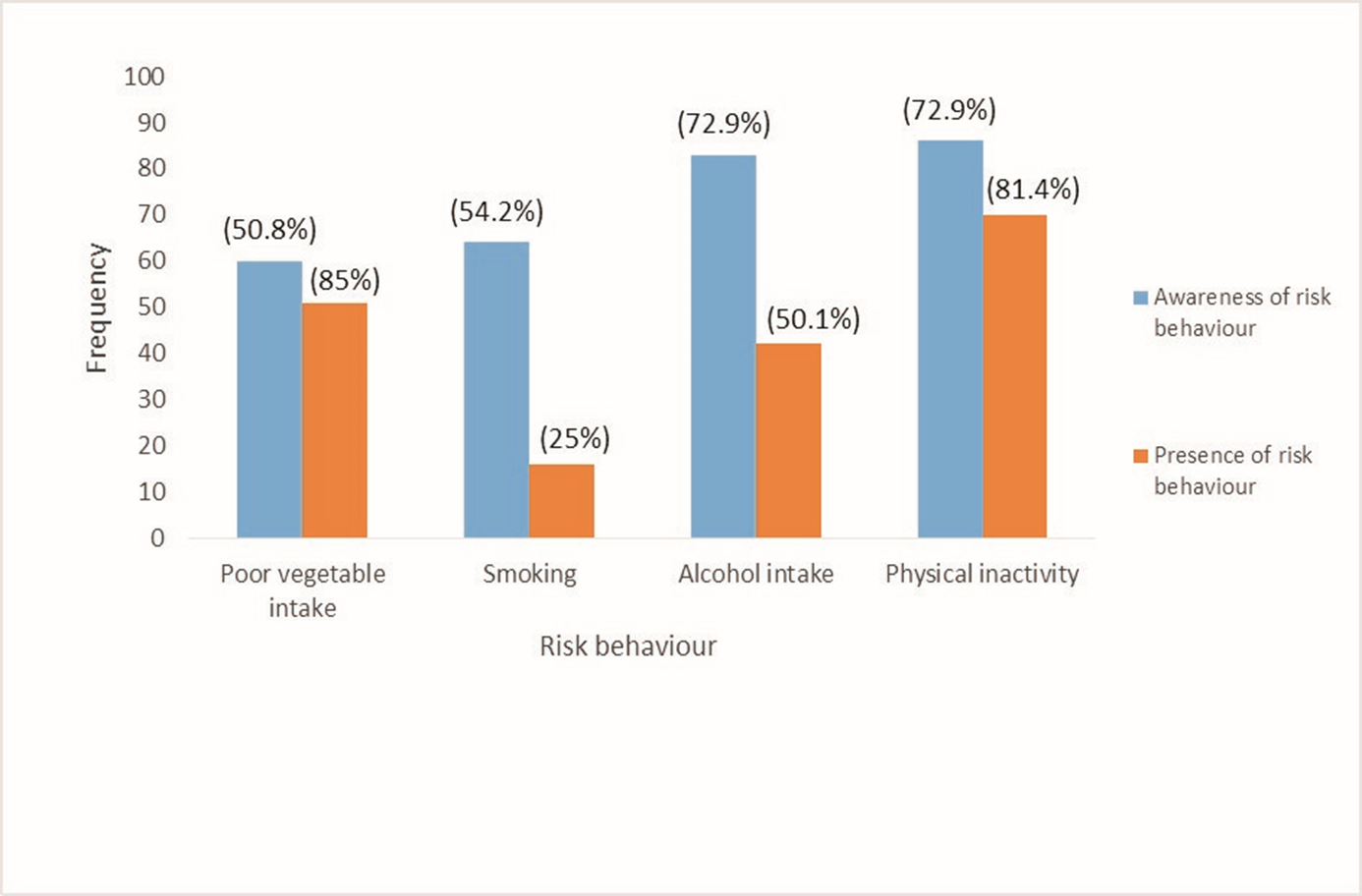Prevalence of diabetes mellitus and the associated behavioral risks factors among the staff of three secondary schools in Owo, Ondo State, Nigeria
Keywords:
Diabetes Mellitus, behavioural risk factors, lifestyle, blood pressure, obesityAbstract
Objective: The prevalence of type 2 Diabetes is associated with significant morbidity and mortality, hence the need for early identification of risk factors. This study, therefore, aimed to determine the prevalence of diabetes mellitus and the associated behavioral risks among secondary school staff in Owo, Ondo State, Nigeria.
Methods: A cross-sectional survey of 118 staff at three secondary schools in Owo was conducted using a structured interviewer-administered questionnaire. Demographic and clinical data were obtained as well as fasting or random blood glucose measurements using standard methods. Data were analyzed with SPSS version 21.0.
Results: The mean age of participants was 43 + 8 years, 59.3% were females. Type 2 Diabetes Mellitus was found in 2.8% of the participants, 18.5% were hypertensive, 22.0% were Obese while 25.4% had abdominal obesity. In all, 13.6% smoke cigarette, 35.6% drank alcohol, 49.2% does not add at least a spoonful of vegetable to their meals, 27.1% does not engage in physical exercise while 78.0% do not eat fruits at least once a day. About 58.4% of the respondents had at least one risky behaviour. More male respondents (22.9%) had a self-perceived risk of Diabetes Mellitus (p=0.001), 40.0% of female respondents had abdominal obesity (p<0.001). Correlation (r=0.347) exist between Waist/Hip ratio and random blood glucose, (p=0.012)
Conclusion: Despite low prevalence of diabetes mellitus, many had at least one risky behaviour. Intensifying efforts on educating the general population on the risk factors for Diabetes Mellitus and lifestyle modification is important.
References
IBM SPSS Statistics for Windows. Version 21.0. IBM Corp. Released 2012. Armonk, NY: IBM Corp.
Ashok J, Manasi S, Gladius J, Shekhar B. A study to assess awareness regarding Diabetes Mellitus and factors affecting it, in a tertiary care hospital in Kancheepurum District. Healthline. 2013;4(2):44-49.
Patil P, Dixit U, Hiralal B. Study of diabetes in Dharwad- an urban area in India. Indian J.Sci.Technol. 2011;4(11):1481-1483.
Alele FO, Ilesanmi OS. Knowledge and Attitude of a Semi Urban Community in the
Desalu OO, Salawu FK, Jimoh AKA, A O,
Busari OA, Olokoba AB. Diabetic foot care: Self reported knowledge and practice among patients attending three tertiary hospital in Nigeria. Ghana Medical Journal. 2011;45(2):60-65.
Pierce M, Harding D, Ridout D, Keen H, Bradley C. Risk and prevention of type II diabetes: offspring's views. The British Journal of General Practice. 2001;51(464):194-199. PubMed PMID: PMC1313950.
Kowall B, Rathmann W, Stang A, Bongaerts B, Kuss O, Herder C, et al. Perceived risk of diabetes seriously underestimates actual diabetes risk: The KORA FF4 study. PLoS ONE. 2017;12(1):e0171152.
Sukanta K, Rashmi R, Harshad T. A study of knowledge and practices in prevention of type 2 diabetes mellitus among Bhilai steel plant employees. Indian Journal of Medical
Specialties. 2012;3(2):143-148.
WHO Bulletin. Waist Circumference and WaistHip Ratio. Report of a WHO Expert Consultation Geneva2008 [06/06/2014]. A v a i l a b l e f r o m : http://www.who.int/nutrition/publications/repo rts/en/.
Bazata DD, Robinson JG, Fox KM, Grandy S. Affecting behavior change in individuals with diabetes: findings from the Study to Help Improve Early Evaluation and Management of Risk Factors Leading to Diabetes (SHIELD).
The Diabetes educator. 2008 NovDec;34(6):1025-1036. PubMed PMID:
Epub 2008/12/17. eng.
Alzaman N, Wartak SA, Friderici J, Rothberg MB. Effect of patients' awareness of CVD risk factors on health-related behaviors. Southern medical journal. 2013 Nov;106(11):606-609. PubMed PMID: 24192590. Epub 2013/11/07. eng.

Downloads
Published
How to Cite
Issue
Section
License
Copyright (c) 2023 Research Journal of Health Sciences

This work is licensed under a Creative Commons Attribution-NonCommercial-NoDerivatives 4.0 International License.
Research Journal of Health Sciences journal is a peer reviewed, Open Access journal. The Journal subscribed to terms and conditions of Open Access publication. Articles are distributed under the terms of Creative Commons License (CC BY-NC-ND 4.0). (http://creativecommons.org/licences/by-nc-nd/4.0). All articles are made freely accessible for everyone to read, download, copy and distribute as long as appropriate credit is given and the new creations are licensed under the identical terms.

